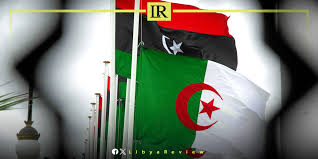The Algerian government has taken fresh steps to strengthen its economic presence in Libya, holding a high-level meeting with local banks and export companies to tackle the challenges facing exporters aiming for the Libyan market. The move is part of Algeria’s wider strategy to increase trade volume with its eastern neighbour and take advantage of what officials describe as a “promising market.”
At the centre of the discussions was Minister of Foreign Trade and Export Promotion, Mr Kamel Rezig, who chaired the coordination meeting in Algiers. Present at the meeting were the Governor of the Bank of Algeria, the Commissioner General of the Association of Banks and Financial Institutions, and several senior officials from the Ministry of Trade, alongside private sector and export-focused institutions.
In a statement released by the Ministry, the meeting was described as an opportunity to openly discuss the difficulties exporters face on the ground, especially when it comes to accessing the Libyan market. Participants highlighted concerns such as logistics challenges, financial transaction risks, regulatory gaps, and border delays, which continue to slow down the smooth flow of goods and services.
Mr Rezig assured stakeholders that the government remains committed to eliminating export barriers. He said steps will be taken to improve logistical support, secure financial transactions, and strengthen coordination with the banking sector. The minister also reiterated the importance of building long-term economic partnerships with Libya that go beyond the usual buying and selling of goods.
He noted that Libya is a natural extension of Algeria’s export base, thanks to its close proximity, shared culture, and existing trade infrastructure. According to Mr Rezig, trade with Libya offers an opportunity for Algerian businesses to expand their reach into North and Central Africa.
Despite their geographical closeness and strong historical ties, trade between Algeria and Libya has remained relatively low. In 2018, bilateral trade stood at about $31 million, rising to $59 million in 2020, and slightly increasing to $65 million in 2021. Out of the 2021 figure, $59 million came from Algerian exports to Libya.
Officials believe this performance does not reflect the full potential of both economies. As a result, both countries are now targeting an ambitious goal: to grow trade to $3 billion annually in the coming years. Achieving this, according to officials, will require removing the existing roadblocks and modernizing trade mechanisms.
To make this vision a reality, Algeria and Libya have outlined a comprehensive trade expansion plan. This includes:
Reopening the Debdeb-Ghadames border crossing to ease land transport.
Improving maritime shipping links to increase the frequency and speed of goods delivery.
Establishing a free trade zone along the border to encourage commercial activity.
Strengthening banking cooperation to enable secure and efficient cross-border payments.
In line with these plans, customs officials from both countries have begun reviving a customs cooperation agreement, which includes proposals to combat smuggling, streamline customs checks, and ensure the safe movement of goods along their 900-kilometre shared border.
Economic experts have welcomed the new initiative but caution that long-term success will depend on policy stability, efficient border management, and real-time support for exporters, especially small and medium enterprises (SMEs).
The Libyan market, although still recovering from years of instability, remains one of the most attractive destinations for Algerian manufactured goods, agricultural products, construction materials, and services.
As regional trade becomes more critical to economic recovery across North Africa, many are watching closely to see whether Algeria can achieve its ambitious trade goals and position itself as a regional export powerhouse.
